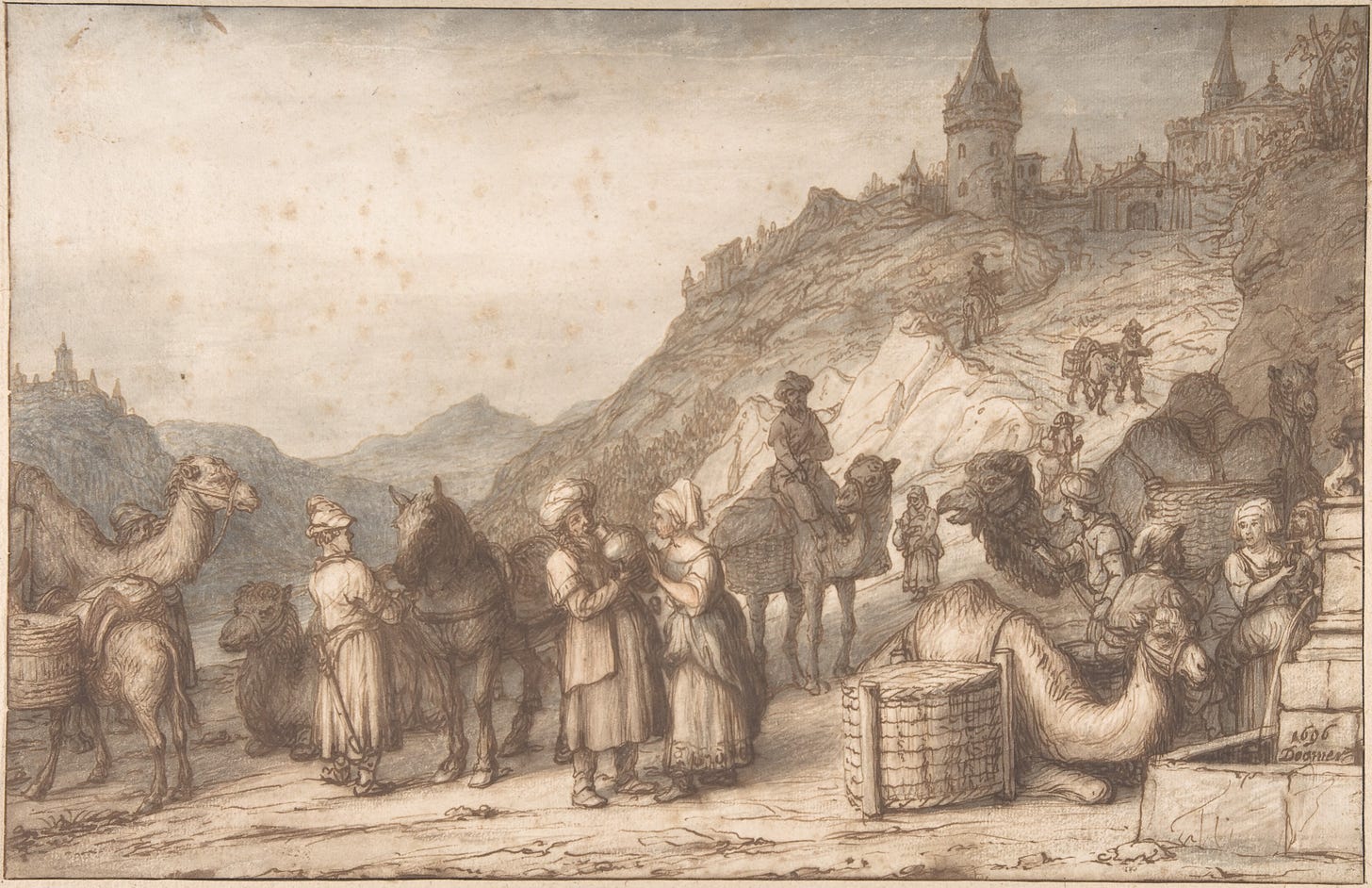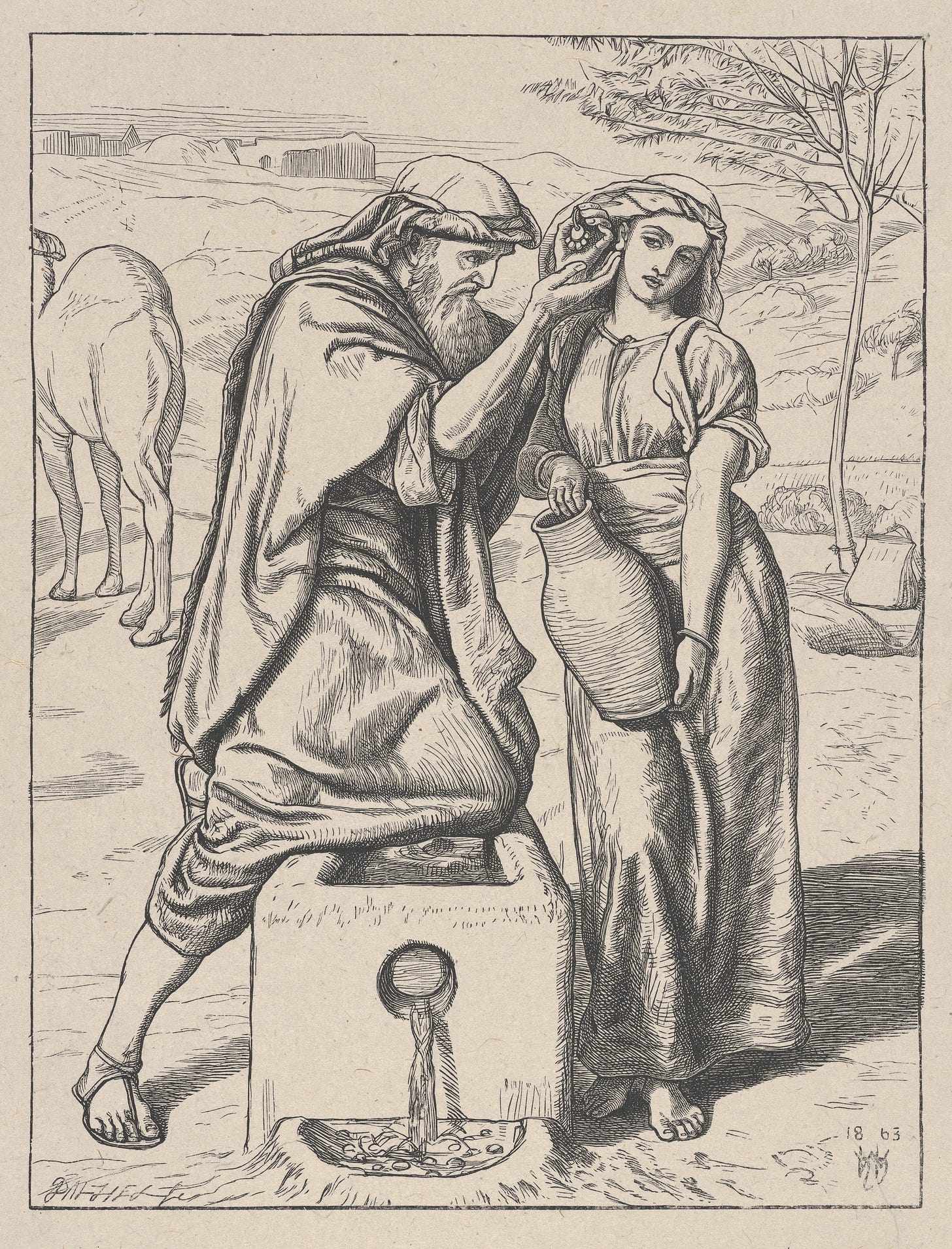Lambert Doomer, 1696
One of the minor figures in Scripture who really moves me is Eliezer of Damascus. We are first introduced to him in Genesis 15 as Abraham’s heir. Later, in Genesis 24, Abraham sends Eliezer (at least, most scholars believe this servant was Eliezer although he is not named) back to Abraham’s homeland to procure a wife for Abraham’s son, Isaac. I think we often overlook how remarkable Eliezer’s story is, and how Eliezer might have behaved differently had he not spent years witnessing Abraham’s faith.
Eliezer lived for decades of his life as Abraham’s trusted servant, while Abraham traveled around with his large household. We often picture Abraham’s household consisting of Sarah, a handful of servants, and some livestock. But Abraham likely had a few thousand people traveling with him. He had great herds of livestock and an army of 318 trained soldiers who had been born in his household. We get a glimpse of how formidable Abraham was in the reactions of those who encountered him. While negotiating over a burial plot for Sarah, the sons of Heth called Abraham a prince (Genesis 23). And local kings wanted to make treaties with Abraham to ensure that Abraham’s clan did not eventually wipe them out (Genesis 21). This means that Eliezer was also a powerful man. And until Isaac came along, he was the man who would have inherited it all after Abraham died.
Against all reason and expectation, Abraham’s extremely post-menopausal wife bore a son, displacing Eliezer as Abraham’s heir. This had to have been a blow, but Eliezer seems to have remained loyal. He continued to be Abraham’s most trusted servant.
At the end of Abraham’s life, Abraham called Eliezer to himself and asked him to put his hand under his thigh. This strange request was a standard accompaniment to solemn oaths. It may have been a self-maledictory oath; Eliezer was possibly inviting a curse on himself such that if he failed or betrayed Abraham his own line would be cut off. It was also an act of extreme vulnerability, perhaps reflecting Abraham’s vulnerability as he entrusted Eliezer with such a delicate and important task.
Abraham does not want Isaac marrying a local Canaanite woman, which would introduce the worship of foreign gods into the line of promise. Eliezer agrees to go to Abraham’s homeland to find a wife. He asks what he is to do if the woman does not want to return with him? Abraham says that in that case he will be released from his oath. Abraham is confident in the Lord’s provision and does not ask Eliezer to go on a wild goose chase. If the woman Eliezer picks out does not end up returning from Eliezer, then the whole thing is off.
You might be familiar with this story. Eliezer arrives in Nahor, sits down by a well, and prays:
O Lord, God of my master Abraham, grant me success today, I pray thee, and show steadfast love to my master Abraham. Behold, I am standing by the spring of water, and the daughters of the men of the city are coming out to draw water. Let the maiden to whom I shall say, ‘Pray let down your jar that I may drink,’ and who shall say, ‘Drink, and I will water your camels’—let her be the one whom thou hast appointed for thy servant Isaac. By this I shall know that thou hast shown steadfast love to my master.
Genesis 24:12-14
William Holman Hunt, 1863–81
Before he even finishes speaking, Rebekah arrives at the well. Eliezer asks her for a drink of water, and Rebekah agrees and then offers to water his camels as well. This was no casual offer. Archaeologists estimate that one camel would have drunk 10 water jugs worth of water, based on the size of water jugs at the time. Multiply that by ten, and you have 100 trips to the well over the course of several hours.1
I think there’s a reading of this narrative where Eliezer does actually have a moment of faithlessness. The test he lays out for Abraham’s God is a relatively impossible one. Eliezer wants the first woman he asks for a drink of water to also offer to water his camels as well. What woman coming to the well to get water for her family would be willing—without even being asked—to take a 3-4 hour break to water the camels of a stranger? And to have the physical vigor and perseverance to follow through with it?
Is it possible that Eliezer wants to have technically done right by Abraham, but to actually fail? Is it possible that he does not believe that such a woman exists, or that if she does exist, she would not want to return with him?
It’s possible, but there’s another read which accounts for Eliezer’s impossible request: he has already seen Abraham’s God do the impossible. He already knows that he serves a man with an extraordinary relationship with a particular deity, a deity he knew nothing about before entering Abraham’s service.
Eliezer can’t have been far when three mysterious men shared a meal with Abraham and told him that 90-year-old Sarah would have a child the following year. Eliezer doubtless remembers when Abraham broke it to him that Sarah had given birth to a son, putting an end to Eliezer being Abraham’s heir. Eliezer may or may not have gone on the bone-chilling journey Abraham took with Isaac to sacrifice him on Mount Moriah. But surely he heard about it afterwards, how Abraham’s God had stayed Abraham’s hand and provided a ram to offer in Isaac’s place. He had seen Abraham pray to this God and then defeat mighty kings in battle. He had seen his master’s wife taken by a local tyrant twice and miraculously delivered twice. Abraham had been walking with God for a long time. But Eliezer’s experience with the acts of Yahweh seem to have been secondhand. Until now.
Eliezer addresses God as “the God of my master Abraham.” He only knew God through Abraham’s testimony and life. But now He prays to the God of Abraham and asks for success, so that God will show love to his master Abraham. (Genesis 24:12) When he realizes he has met one of Abraham’s relatives in precisely the manner he requested he says, “Blessed be the Lord, the God of my master Abraham, who has not forsaken his steadfast love and his faithfulness toward my master. As for me, the Lord has led me in the way to the house of my master's kinsmen.” (Genesis 24:27)
The narrator of Genesis is not particularly concerned with the spiritual journey of Eliezer of Damascus. So we can only speculate about what he was thinking before and after these events. But it moves me to picture Eliezer there at the well, throwing down an impossible request for his master’s God, “Let’s see if this will work.” And then it works. God hears Eliezer’s impossible request and sends Rebekah at just that moment. Rebekah, a woman of strength and action, who performs such an athletic and heroic and hospitable feat that it has almost a mythical quality.
Eliezer has seen God’s astounding presence and provision for Abraham. But now he says, “As for me. . .” Abraham’s God has become Eliezer’s God.
I will utter dark sayings from of old,
things that we have heard and known,
that our fathers have told us.
We will not hide them from their children,
but tell to the coming generation
the glorious deeds of the Lord, and his might,
and the wonders that he has done.
--Psalm 78:2-4
Direct evangelization is not the only way to tell the next generation about God’s faithfulness. When those close to us to witness our faith, when they hear how God has been faithful and kind to us, they may take a gamble and ask that our God would answer their prayer.
It’s fascinating to me that Genesis 24 is the longest chapter in Genesis, and devotes many words to this feat of Rebekah’s, and then the recounting of the feat by Eliezer to her family. It was important that the wife Eliezer brought back for Isaac be worthy of Abraham’s lineage. The text is actually showing how similar Rebekah is to Abraham, who also runs to perform feats of extreme hospitality (Genesis 18), and leaves his family and homeland behind to follow the Lord’s guidance and start a new line (Genesis 12).






This is good!